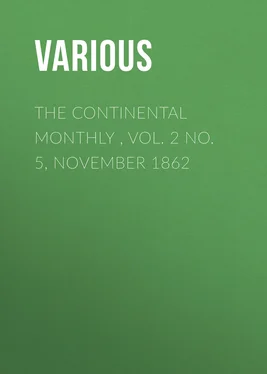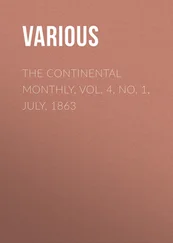Various - The Continental Monthly , Vol. 2 No. 5, November 1862
Здесь есть возможность читать онлайн «Various - The Continental Monthly , Vol. 2 No. 5, November 1862» — ознакомительный отрывок электронной книги совершенно бесплатно, а после прочтения отрывка купить полную версию. В некоторых случаях можно слушать аудио, скачать через торрент в формате fb2 и присутствует краткое содержание. Жанр: foreign_antique, periodic, Языкознание, Политика, foreign_edu, на английском языке. Описание произведения, (предисловие) а так же отзывы посетителей доступны на портале библиотеки ЛибКат.
- Название:The Continental Monthly , Vol. 2 No. 5, November 1862
- Автор:
- Жанр:
- Год:неизвестен
- ISBN:нет данных
- Рейтинг книги:3 / 5. Голосов: 1
-
Избранное:Добавить в избранное
- Отзывы:
-
Ваша оценка:
- 60
- 1
- 2
- 3
- 4
- 5
The Continental Monthly , Vol. 2 No. 5, November 1862: краткое содержание, описание и аннотация
Предлагаем к чтению аннотацию, описание, краткое содержание или предисловие (зависит от того, что написал сам автор книги «The Continental Monthly , Vol. 2 No. 5, November 1862»). Если вы не нашли необходимую информацию о книге — напишите в комментариях, мы постараемся отыскать её.
The Continental Monthly , Vol. 2 No. 5, November 1862 — читать онлайн ознакомительный отрывок
Ниже представлен текст книги, разбитый по страницам. Система сохранения места последней прочитанной страницы, позволяет с удобством читать онлайн бесплатно книгу «The Continental Monthly , Vol. 2 No. 5, November 1862», без необходимости каждый раз заново искать на чём Вы остановились. Поставьте закладку, и сможете в любой момент перейти на страницу, на которой закончили чтение.
Интервал:
Закладка:
WORD-MURDER
The time has come when we must have an entirely new lot of superlatives—intensifiers of meaning—verifiers of earnestness—asserters of exactness, etc., etc. The old ones are as dead as herrings; killed off, too, as herrings are, by being taken from their natural element. What between passionate men and affected women, all the old stand-bys are used up, and the only practical question is, Where are the substitutes to come from? Who shall be trusted to invent them? Not the linguists: they would make them too long and slim. Not the mob: they would make them too short and stout.
There are plenty of words made; but in these times they are all nouns, and what we want are adverbs—'words that qualify verbs, participles, adjectives, and other adverbs.' We could get along well enough with the old adjectives, badly as the superlative degree of some of them has been used. They are capable of being qualified when they become too weak—or, rather, when our taste becomes too strong—just as old ladies qualify their tea when they begin to find the old excitement insufficient. But even this must be done with reason, or we shall soon find with the new supply, as we are now finding with the old, that the bottle gives out before the tea-caddy. The whole language is sufficient, except in the excessives —the ultimates .
Why use up the sublime to express the ridiculous? Why be only noticeable from the force of your language as compared with the feebleness of what you have to say? Why chain Pegasus to an ox cart, or make your Valenciennes lace into horse blankets? If the noble tools did the ignoble work any better, it might be some satisfaction; but cutting blocks with a razor is proverbially unprofitable, and a million-magnifying microscope does not help a bit to tell the time by the City Hall clock. And again: the beggar doth but make his mishaps the more conspicuous by climbing a tree, while the poor bird of paradise, when once fairly on the ground, must needs stay and die, being kept from rising into her more natural element by the very weight of her beauties. Like this last-named victim of misdirected ambition, poetical expressions, being once fairly reduced to the level of ordinary use, so that all feel at liberty to take them in vain, can never 'revocare gradem.'
The elegant, however, is not so much of a loss, as the strong and serviceable part of the language;—which, so far, is like grain in a hopper, always being added to at the top, and ground away at the bottom. The good old unmistakable words seem to sink the faster from their greater specific gravity compared to the chaff that surrounds them; for example: Indeed used to be a fine and reliable word for impressing an assertion, but now it is almost discarded except as a sort of questioning expression of surprise, which might advantageously be shortened thus:?! Strictly interpreted, it denotes a lack of faith, suggesting a possible discrepancy between the words of the speaker and the deeds they relate to. It is but one step removed from the politeness of the Sligo Irishwomen, who say, 'You are a liar,' meaning exactly what an American lady does in saying 'You don't mean so!'
I suppose it seemed as if the force of language could no further go, when men first said really . "What is more indisputable than reality? But it has come to be a sort of vulcanizer, to make plain English, irony. Nowadays, when a young lady adds, 'really,' one may know that she means to cast a doubt over the seriousness of what she says, or to moderate its significance. 'Really, sir, you must not talk so,' is the appropriate form for a tone of decided encouragement to continue your remarks—probably complimentary to herself, or the opposite to some friend. And so we might go on down, taking every word of the sort from the dictionary, and comparing its usefulness now, with that of the time when it had no ambiguity.
Positively , seriously , perfectly , and their synonymes, have been subtracted, one after another, from our list of absolute words,—Burked, carried off, and consumed, by people who, if they had each had the finishing off of one word, instead of each doing a part at the ruin of all, would deserve to have their names handed down to posterity in connection with the ruin they had wrought, as much as ever Erostratus or Martin did; the former, we all know, was he of whom it is said:
'The ambitious youth who fired th' Ephesian dome
Outlives in fame the pious fool that reared it.'
The latter, it is not so well known, did likewise by Yorkminster, for a similar purpose, and is now, as Mrs. Partington would say, 'Expatiating his offence' in a lunatic asylum. But their name is legion. How many a man, perhaps, 'father of a family, member of the church, and doing a snug business,' hears every day or two 'positively and without joking or exaggeration, the most perfectly absurd and ridiculous thing, he ever heard in all his born days!'
Actually was a nice word. We suffered a loss when it died, and it deserves this obituary notice. It was a pretty word to speak and to write, and there was a crisp exactness about its very sound that gave it meaning. Requiescat in pace. But last and most to be lamented, comes literally . I could be pathetic about that word. So classic—so perfect—it crystallized the asseveration honored with its assistance. And so early dead! Cut off untimely in the green freshness of its days—and I have not even the Homeric satisfaction of burying it! It still wanders in the shades of purgatory, Vox et præterea nihil ; being bandied about from mouth to mouth of the profane vulgar. And not even by them alone is disrespect offered it, for the grave and practical Mr. Layard says somewhere in the account of his uncoveries, 'They literally bathed my shoes with their tears!' Idem, sed quantum mutatus ab illo! I am almost tempted to the ambiguous wish that he might have slipped in literally to one of the many graves he robbed figuratively.
Now listen for a moment to Miss Giggley, who is telling of her temptation to laugh at some young unfortunate who thought he was making himself very agreeable. 'Really and truly, upon my word and honor, I positively thought I—should—die: as sure as I'm alive.' You pretty liar! You smiling murderess! You playful puss, gracefully toying with the victims your sweet mouth kills! Those expletives were like five strong men standing in a row, and you were like a bright, innocent-looking electric machine, with its transparent and clear-voiced cylinder, which is capable (give it only enough turnings) of making the men, at a shock, into five long, prostrate heaps of clay, lifeless, useless, and offensive, as are the expletives in question, by reason of a succession of just such shocking assaults as the untruth you this moment swore to.
Anonymous writers, as a class, might be called the Boythorns of Literature. All of them, from Junius down, have shown a great satisfaction in waving a tremendously sharp sword out from behind a fence. Sometimes the hand that has held the weapon was strong enough to have done good service wherever it might have been engaged, but always the wielding is a little more fearless than if the owner's face were visible, and usually it is the better for his cause that it was not. We all know what a very large cannon the monkey touched off, and how, if any one had been in the way, it might have hurt him very much. As when a traveller writes of a far country, he tries to make it seem worth all the trouble he took to go there, so a critic must find enough bad about a book to make his article on it important and interesting.
These exaggerators—these captatores (and occisores ) verborum —have no idea of the adaptation of means to ends. They are not deficient in forces—they have a powerful army, but no generalship. Horse, foot, and artillery; it's all vanguard. Right, left, and centre—but all vanguard. At the first glimpse, pioneers and scouts, rank and file, sappers and miners, sutlers and supernumeraries, all come thundering down like a thousand of brick, and gleaming in the purple and gold of imagery, to rout, disperse, and confound their obstacle; even if it's only a corporal's guard of one private!
Читать дальшеИнтервал:
Закладка:
Похожие книги на «The Continental Monthly , Vol. 2 No. 5, November 1862»
Представляем Вашему вниманию похожие книги на «The Continental Monthly , Vol. 2 No. 5, November 1862» списком для выбора. Мы отобрали схожую по названию и смыслу литературу в надежде предоставить читателям больше вариантов отыскать новые, интересные, ещё непрочитанные произведения.
Обсуждение, отзывы о книге «The Continental Monthly , Vol. 2 No. 5, November 1862» и просто собственные мнения читателей. Оставьте ваши комментарии, напишите, что Вы думаете о произведении, его смысле или главных героях. Укажите что конкретно понравилось, а что нет, и почему Вы так считаете.












